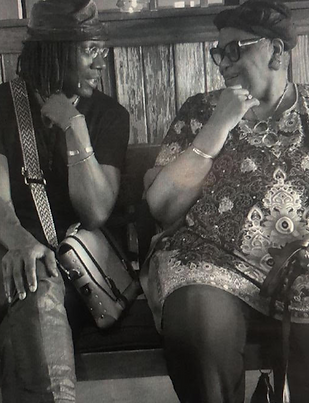
THE BEGINNING
About the Founder Dr. Dixon Chibanda
Dixon Chibanda is the founder and Global Lead of Friendship Bench. He is a leader in the global conversation to democratize mental health care, published researcher, and author of 'The Friendship Bench: How Fourteen Grandmothers Inspired a Mental Health Revolution'.

He is a practising medical doctor and professor of psychiatry & Global Mental Health at the University of Zimbabwe and The London School of Hygiene & Tropical Medicine. He is the Director of the African Mental Health Initiative (AMARI) and a founding member of Coalition for Scaling Mental Health which aims to close the mental health care gap across the world. Dixon started the Friendship Bench in one of Harare’s townships called Mbare in 2006 and conceptualized the first Friendship Bench which has now been refined and adapted in all the 10 provinces of Zimbabwe, and replicated in over 10 countries. He now leads the team to scale it up across the globe. He has been for over a decade a key player in bringing the various stakeholders from local health authorities, health professionals, national and international researchers, and donors together to form successful collaborations. In his role as PI on several research projects, he has led the Friendship Bench team through the rigorous exercise of randomized control trials (RCT) which have consistently showed evidence for the intervention’s effectiveness. The effectiveness of the Friendship Bench is highlighted in a seminal cluster randomized controlled trial published in JAMA. In addition, over 100 peer-reviewed scientific publications of the program are accessible online. As a practising medical doctor, professor in psychiatry & global mental health, Dixon has explored the intersection of indigenous knowledge and western models of care to develop sustainable interventions in global health. His TED talk on why he trains grandmothers to treat depression describes the journey of the Friendship Bench.
Today there are over 3,000 grandmothers in Zimbabwe
Friendship Bench was founded in Zimbabwe, and has been replicated in 9 countries ( El Salvador, Botswana, Malawi, Tanzania, Kenya, USA, UK, Colombia, and Vietnam).

FRIENDSHIP BENCH NOLA
Launching Soon

CONNECT WITH US
SOCIAL MEDIA




WHO WE ARE
VISION
We envision a city with safely created and curated NOLA Friendship Bench healing spaces in every neighborhood in New Orleans that facilitate emotional and mental well-being.
MISSION
New Orleans community will have a diverse cadre of well-trained lay mental health workers who utilize the Friendship Bench to destigmatize emotional and mental wellness; and increase access to evidenced based, culturally centered talk spaces where African American individuals, children youth, families are empowered to deal with everyday stressors of life and “ kufungisisa” – thinking too much- depression and anxiety.
GUIDING PRINCIPLES
1. CHC creates safe spaces for natural community healers to come, "sit at the table and play" ( let our collective creative minds explore new innovative approaches to individual and community emotional well-being and mental health), as lives are at stake.
2. CHC makes natural community healers visible through acknowledgement, engagement, training, coaching and support.
3. CHC is a catalyst for changing societal views on emotional and mental health.
4. CHC establishes safe spaces for creative tension ( the gap between creative vision and our current reality) to catapult us to innovation in the field of mental and behavioral health.
5. CHC is committed to community and culture in all phases of our work.
6. CHC seeks partners who believe that community and culture are the answer to the personal management of emotional and mental stressors within and throughout the African American community.
CORE VALUES
1. We value individuals right to self-determination
2. We value empowerment of those we serve
3. We value interpersonal dynamics of human relationships
4. We value individuals as their own expert
5. We value collaborative partnerships with community, service providers and those we serve
6. We value competent compassionate service delivery
7. We value use of cultural in the healing process
OUR STORY

Dr. Dixon Chibanda and Carole Bebelle
Dr. Dixon Chibanda presented at the TEDWomen in 2017 and it led to his meeting Carol Bebelle and Dr. Petrice Sams-Abiodun. The Friendship Bench model was explained at a Hospitality Suite and Dr. Chibanda shared his story of what started this project. Some years later, Carol and Ron McClain found themselves sitting together at a goodbye celebration for Flozell Daniels leaving the CEO position at the Foundation for Louisiana and in an extended conversation they began to lament the crime and violence in the community and tried to identify contributing factors, mental health being one of the big ones. Many of the culprits were young black males. They were particularly concerned about the dire need for mental health services and the insufficient resources to meet the demand. This conversation then opened the memory portal of Carol Bebelle to the conversation had with Chibanda some years earlier. And since Carol and Ron had a common history with the Great Expectations program, a community-based parent support infant mortality reduction strategy of the 1980s. She offered the possibility that the Friendship Bench model from Zimbabwe could work in New Orleans given the vibrant culture and wide range of folks who participate in healing practices (ministers, counselors, priests, coaches, mentors, etc.). The dismal personality to conversation took an uplift in just the consideration of this possibility. In the next few months, Ron and Carol had several conversations further developing the idea of having a Friendship Bench model here in New Orleans. More months later, Ron McClain shared a draft of a proposal he was submitting to the Institute for Mental Health which would award a two year planning grant to the Millie Charles School of Social Work at Southern University of New Orleans to plan and implement a New Orleans Friendship Bench model program.







